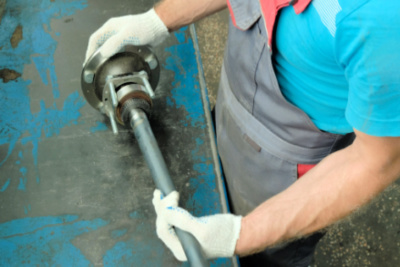Damage to your car’s axle is a serious mechanical issue that can’t be ignored. Whether it’s a minor crack or a full break, axle damage can jeopardize your safety, reduce vehicle performance, and lead to costly repairs. In some cases, the repair costs can be so high that your insurance may deem the car a total loss. In this refreshed guide, we’ll explore whether axle damage can total a car, how to identify the signs, what repair costs you might face in 2024, and what options you have if the car isn’t worth fixing.
Can Axle Damage Total a Car?
So, does a bent or broken axle mean your car is totaled? The answer depends on the severity of the damage and your car’s overall value. Repair costs for axle damage can range from as low as $400 to more than $7,500. If repair expenses approach or exceed your vehicle’s market value, your insurance provider may declare it a total loss.
An axle is a critical component in your car’s drivetrain. It connects and powers your wheels, supports vehicle weight, and ensures proper alignment. If the axle is compromised, your car may not be drivable—even if the engine and transmission are functioning properly. This makes axle issues not only expensive but also potentially dangerous if left unaddressed.
Axle Damage Repair Costs
Axle repair costs can vary significantly based on the location and extent of the damage, the make and model of your car, and whether you’re dealing with a front axle, rear axle, or constant velocity (CV) axle.
Here’s an updated breakdown of repair and replacement costs:
- CV axle replacement: $100 – $250
- CV boot replacement: $150 – $300
- Rear axle shaft: $200 – $450
- Front axle repair: $500 – $700
- Rear axle repair: $450 – $600
- Front axle replacement: $800 – $4,500
- Rear axle replacement: $1,000 – $3,800
- Labor costs: $75 – $150 per hour
- Wheel alignment (often required): $75 – $250
Parts shortages and inflation in 2025 have caused many of these prices to rise, especially for imported vehicles. It's important to get multiple repair quotes before making a decision.
How to Tell if Your Axle is Damaged
Axle damage may not always be immediately visible, but several symptoms can indicate a serious problem. If you notice any of the following issues, it’s best to have your vehicle inspected by a certified mechanic:
- Unusual clunking, clicking, or grinding noises when turning or accelerating
- Vibrations or wobbling while driving
- Difficulty steering or rough turning
- Grease leaking near the tires (a sign of a cracked CV boot)
- Pulling to one side or alignment issues
Damage may occur in different components of the axle assembly, such as the CV joint, CV boot, or axle shaft. Even a minor bend in the axle can significantly affect driving performance and safety.
Can Axle Damage Affect the Transmission?
Yes. Axle and transmission components are mechanically connected. A damaged axle can strain your transmission, cause gear slippage, or puncture the transmission fluid reservoir. This adds to your repair bill and further increases the likelihood of your car being totaled.
Transmission damage related to axle failure can cost anywhere from $1,000 to $4,000 to repair. That’s why it’s crucial to address axle problems early, before they snowball into more severe drivetrain issues.
Insurance Coverage for Axle Damage
Whether or not insurance covers your axle damage depends on the cause. If the damage was the result of a collision, pothole impact, or accident, comprehensive or collision coverage typically applies. However, standard liability insurance does not cover axle repairs.
Insurers will compare the estimated repair cost to your vehicle’s actual cash value (ACV). If the repair exceeds a certain percentage (usually 70-80%) of your car’s value, they may declare it a total loss. You’ll receive a payout equal to the ACV minus your deductible.
Should You Repair or Sell a Car with Axle Damage?
If your repair estimate is high and your car is older or has other issues, it might not be worth fixing. In such cases, you may want to consider selling the car, either for parts or to a service that specializes in buying damaged vehicles.
Some things to consider before making your decision:
- Is the damage isolated to the axle or are other systems involved?
- Does your insurance payout make repair feasible?
- What’s your car’s current resale or scrap value?
Selling a Car with Axle Damage
Repairing a broken axle can be cost-prohibitive. If you’re leaning toward selling, services like DamagedCars make the process fast and easy. They specialize in buying vehicles that are non-running, wrecked, or totaled—including those with axle damage.
Here’s how their process works:
This hassle-free option can help you move on from a costly repair and put money back in your pocket.
Conclusion
Axle damage is more than just a mechanical inconvenience—it’s a potential dealbreaker for your vehicle’s longevity and value. While minor issues may be affordable to fix, severe axle or transmission damage can quickly turn your car into a financial liability. If the repair costs are high and your car’s value is low, it may be best to sell it rather than sink more money into repairs.
We Buy and Pick Up Damaged Cars, Nationwide!
Principal Cities:
See All Locations Here
We Buy All Brands And Models, Such As:
YEARS: 2004, 2005, 2006, 2007, 2008, 2009, 2010, 2011, 2012, 2013, 2014, 2015, 2016, 2017, 2018, 2019, 2020, 2021, 2022, 2023



